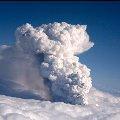A volcanic eruption in Iceland sent a plume of ash into the atmosphere. British airspace has been closed down for the first time since the September 11, 2001 attacks on New York.
"What we are seeing in Iceland is that as the magma particles get towards the surface, they interact with the very cold water and they chill to form glassy fragments and these glassy fragments are small, they have sharp edges and when those get up in the air that is what is causing the risk to aviation," says Colin Macpherson, a professor of Earth sciences at Britain's Durham University. Aviation analysts say the sharp volcanic particles can damage a jet engine or cause it to shut down in mid air. Macpherson says the disruption is due to a combination of things.
"It is not just a case of understanding the activity at the volcano itself, what we are also seeing the effect of at the moment are the prevailing weather conditions because we are in a northerly air stream at the moment and that is bringing the volcanic dust from Iceland down over the U.K. and hence the caution on behalf of the aviation authorities," he said. Macpherson says the ash cloud is not unusual nor is the eruption of the volcano Eyjafjallajokull after 200 years of dormancy.
"Any substantial eruption of a volcano has a potential to do that over a short period of time. By geological standards, this is not what we would call a big eruption," he said. Macpherson says there is also no way of knowing whether there could be another eruption that could cause a similar ash cloud.
"Because there are only a couple of previous records of eruption at this particular volcano, it is difficult to judge either how long the activity will go on there, or how long the volcano might then be dormant before it goes active again," he said. Meteorologists and aviation authorities are monitoring wind direction and the ash cloud's movement from Iceland to determine where and when to shut down airspace in Europe. There has also been extensive flooding in the southeastern part of Iceland as parts of a glacier were melted by the volcano.

